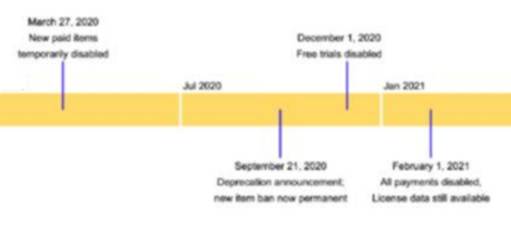| Google's Ban On Paid Chrome Extensions Now Permanent |
| Written by Alex Armstrong | |||
| Tuesday, 29 September 2020 | |||
|
Back in March 2020 Google temporarily suspended publishing Chrome paid extensions. Now it has announced that this ban has been made permanent and from February 2021 all paid Chrome extensions will lose access to payments through the Chrome Web Store. The announcement made on the Chrome Developer blog provides the following key dates:
We need to go back to January 2020 to find the original motivation for phasing out of paid extensions or in-app items when Simeon Vincent notified extension developers of a temporary ban on publishing new paid items. The reason for this was that the Chrome Web Store team had detected: a significant increase in the number of fraudulent transactions involving paid Chrome extensions that aim to exploit users. Although that disablement was only temporary it restarted in March: due to resource constraints due to Covid-19. September's announcement has the effect of making that temporary restriction permanent, affecting only new extensions and in-app items, but the at the next milestone, December 1st, any existing in-app free trials will no longer work and from February1st, 2021 all existing paid for extensions and in-app purchases can no longer charge money or collect revenue via Chrome Web Store payments. Details of the changes developers need to make to migrate their billing are outlined in the September 21 announcement, but as we discovered a year ago, see Chrome Extensions - A Tale of Extremes, only 8.9% of Chrome extensions are paid, representing only 2.6% of installs, and 5,885 of the 16,718 paid extensions (~35%) don’t have any users at all, presumably making them moribund. Successful Chrome extensions will probably already be using alternative payment methods, but they may still rely on the Chrome Web Store for licensing, in which case they will need to take action with regard to the fact that the Chrome Web Store Licensing API is being deprecated, although no date has yet been given for the point at which it will cease to provide status information. From February 1st however subscriptions won't auto-renew, which suggests action should be taken sooner rather than later.
More InformationChrome Web Store payments deprecation Related ArticlesChrome Apps Are No More - End Of An Era To be informed about new articles on I Programmer, sign up for our weekly newsletter, subscribe to the RSS feed and follow us on Twitter, Facebook or Linkedin.
Comments
or email your comment to: comments@i-programmer.info |
|||
| Last Updated ( Tuesday, 29 September 2020 ) |



